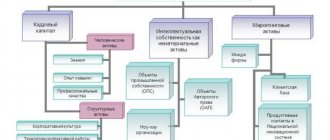While in a registered marriage, one of the spouses registers the acquired apartment as their property. What pitfalls can await him during a possible division of property? How can legislation protect his interests and the interests of other family members? We will tell you about the most important points that every owner should know in this material.
Registration of purchased real estate
There are different ways to purchase real estate during marriage:
- for one of the spouses;
- into joint ownership without allocating a specific share to each;
- with the allocation of shares - in equal proportions or divided by agreement of the spouses according to the invested funds.
While the family lives in marriage, these moments do not play a big role. But if it comes to divorce and division of acquired property, the principle of registration of property will play a decisive role. How will property issues be resolved in the event of a family breakdown?
Important! Let’s make a reservation right away that we are talking about real estate acquired during marriage. If the apartment was owned by one of the spouses before the marriage, it is considered premarital property and is not subject to division under any circumstances. estate received as a gift or inherited, regardless of the time of its receipt, during marriage or earlier, is also not considered joint property
Common joint property as a concept
The concept of common joint property is given by the Civil Code of the Russian Federation.
This is a type of common ownership of an apartment in which several people can be its owners, when the share of each of them in the ownership right is neither mathematically nor physically determined.
In accordance with current legislation, the emergence of the right of common joint ownership of an apartment is provided only for spouses acquiring a property during marriage.
Registration of an apartment for one of the spouses
Most often, the purchase of an apartment or house is registered in the name of one of the family members, the husband or wife. The reason is a simpler registration process (there is no need for both spouses to complete all the necessary formalities).
Regardless of whose income was the source of funds for the purchase of housing, it will be joint property if acquired during a legal marriage. It should be taken into account that when registering with Rosreestr, you will have to provide a document confirming the consent of the second spouse to purchase living space.
Important! Such a document will not be required only when registering real estate when:
- the apartment is purchased as shared ownership;
- there is a marriage contract, which spells out in detail in what situations and how spouses have the right to dispose of property;
- There is a power of attorney from the second spouse to draw up a purchase and sale agreement.
You can obtain permission from your husband (wife) to purchase an apartment in advance. In this case, two options for such a document are allowed:
- indicating the specific housing (address, other technical data);
- consent to purchase real estate without specifying the object.
Consent from the spouse must be certified by a notary. This is done in order to protect the seller from terminating the transaction through the court if the buyer’s husband (or wife) wants to challenge the purchase and sale agreement and seek a refund.
Property tax deduction for the purchase of housing by spouses in common joint ownership
When purchasing a home in joint ownership, both spouses have the right to a deduction with the opportunity to distribute it by agreement . By default, the deduction is distributed in equal shares (50%), but spouses can redistribute it in any proportion, up to 100% and 0%.
The shares of the deduction are determined by submitting to the tax office an Application for the distribution of the deduction, signed by both spouses (Letters of the Ministry of Finance of Russia dated 03/29/2017 No. 03-04-05/18320, dated 04/20/2015 No. 03-04-05/22246, dated 04/08. 2015 No. 03-04-05/19849, Federal Tax Service of Russia dated September 18, 2013 No. BS-4-11 / [email protected] ).
When distributing, it is important to remember that:
— the maximum amount of deduction for each spouse cannot exceed 2 million rubles (to be returned 260 thousand rubles).
— an application for distribution of the main deduction is submitted once, and subsequently the spouses cannot change the ratio in which the deduction will be received, including transferring the remainder of the deduction to the other spouse.
Reason: Letters of the Ministry of Finance of Russia dated 09/07/2012 No. 03-04-05/7-1090, dated 08/28/2012 No. 03-04-05/7-1012, dated 07/20/2012 No. 03-04-05/9-890, dated May 18, 2012 No. 03-04-05/7-647.
Note: If the cost of housing is more than 4 million rubles, then when contacting the tax office, it is not necessary to submit an application for a deduction, since the deduction is distributed by default at 50%. Accordingly, each spouse will be able to receive the maximum possible deduction in the amount of 2 million rubles (260 thousand rubles to be returned).
Example: Spouses Shapovalov O.I. and Shapovalova N.T. In 2021, we purchased an apartment worth 4.5 million rubles as joint property. Since the apartment costs more than 4 million rubles, each spouse will be able to receive a deduction in the maximum amount of 2 million rubles (for a return of 260 thousand rubles).
Example: In 2021, the spouses of Avesov E.Z. and Avesova T.M. We bought an apartment worth 3 million rubles for joint ownership. Since Avesov E.Z. income is greater than that of Avesova T.M., the spouses decided to distribute the deduction in proportion: 2 million rubles to the spouse (for a return of 260 thousand rubles) and 1 million rubles for the wife (for a return of 130 thousand rubles). In the future, when purchasing another home, the spouse will be able to receive an additional deduction of 1 million rubles (towards a return of 130 thousand rubles).
Example: Spouses Ptichnikov P.P. and Ptichnikova A.A. purchased an apartment worth 2 million rubles in 2021 for joint ownership. Since Ptichnikov P.P. does not officially work, then they decided to redistribute the entire deduction (100%) to the spouse. As a result, the spouse will receive a deduction in the maximum amount of 2 million rubles (260 thousand rubles to be returned).
Distribution of mortgage interest deductions for common joint property
Before January 1, 2014, the mortgage interest deduction was always distributed in the same proportion as the main deduction. However, from January 1, 2014, the interest deduction was allocated as a separate type of deduction, and now it can be distributed separately and in a proportion other than the main one (clause 4, clause 1, article 220 of the Tax Code of the Russian Federation, Letter of the Ministry of Finance of Russia dated 16.05. 2017 N 03-04-05/31445, dated 10/01/2014 N 03-04-05/49106).
Accordingly, at their own discretion and regardless of the distribution of the main deduction, spouses can distribute the deduction by interest in any proportion (for example, 50/50, 0/100) by submitting an Application for Distribution of the Deduction to the tax office.
Example: Spouses Chirkov A.B. and Chirkova Y.V. In 2020, we bought an apartment in joint ownership worth 4 million rubles. To buy an apartment, the Chirkovs took out a mortgage loan in the amount of 2 million rubles. In this case, the loan was issued entirely to the husband, and the wife acted as a co-borrower.
The spouses submitted to the tax office an application for the distribution of expenses, according to which they would receive the main deduction of 50% each, and the husband A.B. Chirkov would receive the full deduction for interest. (100% for him, 0% for his wife).
As a result of the purchase, each spouse will be able to receive a basic deduction in the amount of 2 million rubles (refundable in 260 thousand rubles) from the cost of purchasing the apartment, and Chirkov A.B. will also receive a deduction for interest in full, regardless of who the payment documents for the loan payment will be issued to.
According to the opinion of the Federal Tax Service of Russia, spouses have the right to annually, on the basis of an application, redistribute the amount of costs for repaying interest (Letter of the Ministry of Finance of Russia dated November 6, 2015 No. 03-04-05/63984, dated October 1, 2014 N 03-04-05/49106).
Example: In 2021, the spouses Tishin E.E. and Tishina A.S. We bought an apartment in joint ownership worth 4 million rubles. To purchase Tishina’s apartment, we took out a mortgage loan in the amount of 2 million rubles, on which we paid interest in the amount of 200 thousand rubles for 2021. In 2021, the spouses submitted an application to the tax office to distribute the main deduction and the interest deduction by 50%. Accordingly, each of them declared a basic deduction in the amount of 2 million rubles (to be returned 260 thousand rubles) and an interest deduction in the amount of 200 thousand rubles. x 1/2 = 100 thousand rubles. (to be returned 13 thousand rubles).
In 2021 Silence A.S. went on maternity leave, and therefore in 2021 the spouses decided to redistribute the interest deduction entirely to the husband (100%), submitting to the tax office a new application for the distribution of the interest deduction in the proportion of 100% - Tishina E.E. and 0% - Silence A.S.
Features of dividing an apartment purchased during marriage
An apartment purchased during marriage can be registered to one owner. However, you need to remember that registering property rights for only one spouse has its pitfalls. We are talking about the possible division of jointly acquired property.
This situation most often arises in the process of divorce, but even if the family is preserved, it is quite likely that the second spouse will want to secure his right to real estate. And it is not at all necessary that the apartment or house will be divided equally.
If the spouses fail to reach an agreement through negotiations, the size of each share will be determined by the court. The interests of minor children, the existence of a marriage contract and other legally established nuances will be taken into account.
However, an owner who bought real estate while married and registered ownership only in his own name, in certain cases may well claim its indivisibility. There are several reasons for this decision.
Housing was purchased with money inherited or donated by a relative
In such a situation, you will need to take care of two things:
- record the fact of donation by agreement with a notary or make copies of documents on bank transfer of funds from the donor to the recipient. In an inheritance situation, you will need an appropriate notarial certificate;
- record the fact of transfer of funds for the purchased housing from the buyer’s personal account.
If the apartment was purchased in cash, you must have a document confirming the origin of the amount spent on the purchase. This will help subsequently prove that the purchased housing was, in fact, given to one of the spouses and the second cannot claim a share in it.
The apartment was purchased entirely with the owner’s income
The fact that the second spouse is fully supported by the owner of the property without good reason may result in the housing purchased during the marriage going to the person who purchased it.
It should be borne in mind that the court may recognize the following as valid reasons for lack of income:
- the need to care for a sick relative, confirmed by a doctor’s conclusion (certificate of disability);
- the presence of minor children who are being raised by a non-working spouse;
- a serious illness that does not allow the second spouse to work and earn their own income.
The Supreme Court told how spouses should divide shared property
We need an agreement on the division of common property
After the divorce of Marina Kurbaeva* and Igor Idrasov*, a dispute arose about the division of jointly acquired property. During the marriage, the parties, using common funds, acquired a plot of land and a residential building, which was registered in the name of Idrasov and two common daughters, 1/3 of a share each. Kurbaeva decided that the 1/3 share of the land plot and residential building owned by the defendant is the common joint property of the spouses and is subject to division in equal shares. She went to court, where she asked to recognize her ownership of 1/6 of the specified real estate.
CASE No. 20-KP9-13
PLAINTIFF: Marina Kurbaeva*
DEFENDANT: Igor Idrasov*
ESSENCE OF THE DISPUTE: Division of property acquired during marriage, registered as the shared ownership of one of the spouses
DECISION: If there is no agreement on the division of jointly acquired property, it is divided equally between the spouses
The Kirovsky District Court of Makhachkala refused to satisfy the claim, the Supreme Court of the Republic of Dagestan left the decision unchanged. The courts came to the conclusion that the parties during the marriage made a division of jointly acquired property with a deviation from the beginning of equality of shares, taking into account the interests of minor children. Therefore, the 1/3 share of the disputed real estate belonging to the defendant is not common joint property and is not subject to division.
Kurbaeva appealed to the Supreme Court. He recalled: spouses have the right, at their discretion, to change the regime of common joint ownership of property acquired during marriage or part thereof on the basis of a marriage contract or any other agreement that does not contradict the norms of current legislation (Article 37, paragraph 2 of Article 38, Article 41– 42 of the Family Code). Meanwhile, there is no reliable evidence in the case materials confirming that an agreement was reached between the plaintiff and the defendant on the division of jointly acquired property. Neither the purchase and sale agreement of a land plot with a residential building, nor the registration of the right to common shared ownership is such an agreement on the division of the common property of the spouses. Therefore, the Supreme Court canceled the previously adopted acts and sent the case for a new trial to the court of first instance (No. 20-КГ19-13). It has not yet been reviewed.
Property acquired during marriage belongs to both spouses
“The right to common property acquired by spouses during marriage belongs to both spouses, regardless of which of them and in whose name it was acquired. In the event of a dispute, spouses are not required to prove the fact of community of such property. The corresponding explanations are given in paragraph 15 of the Resolution of the Plenum of the Supreme Court of November 5, 1998 No. 15,” said adviser Muranov, Chernyakov and partners Muranov, Chernyakov and partners Federal Rating. group Arbitration proceedings (medium and small disputes - mid market) group Dispute resolution in courts of general jurisdiction Olga Benedskaya. Lawyer Infralex Infralex Federal rating. group Antimonopoly law (including disputes) group Arbitration proceedings (medium and small disputes - mid market) group Bankruptcy (including disputes) group PPP/Infrastructure projects group Land law/Commercial real estate/Construction group Digital economy group Corporate law/Mergers and acquisitions group Tax consulting and disputes (Tax disputes) group Family and inheritance law group Tax consulting and disputes (Tax consulting) group Criminal law Company profile Irina Zimina noted that a similar approach existed in the courts before (No. 33-11973/2018). “The determination of the Supreme Court is very important, since some lower courts incorrectly interpret the current norms of family law, which is what happened in the case considered,” noted Anna Zabrotskaya, partner and head of the Dispute Resolution practice of Borenius Attorneys Russia Borenius Attorneys Russia Federal rating. Group Corporate Law/Mergers and Acquisitions Group International Litigation. According to Elena Siebert, manager of the auditing and consulting group BDO Unicon, the lower courts, when denying one of the spouses a claim, were guided solely by the fact of registering property in the name of the other spouse and the presence of minor children: “This approach cannot be considered correct and based on law."
The definition of the Supreme Court clearly returns us to the source - the law. It establishes that the division of the property of the spouses must be carried out in the prescribed manner: by marriage contract, agreement or court.
Galina Pavlova, managing partner of Pavlova and partners Pavlova and partners Federal rating. group Family and inheritance law group Insurance law group Private wealth management group Bankruptcy (including disputes) group Arbitration proceedings (major disputes - high market) Company profile
Benedskaya is sure that the court, upon a new examination, will find out whether a marriage contract or an agreement on the division of property was concluded between the parties. If they were not concluded, then the claim will be satisfied. Lawyer AB Kazakov and partners Kazakov and partners Federal Rating agreed with her. Antitrust Law group (including disputes) Bankruptcy group (including disputes) Natural Resources/Energy group Criminal Law group 22nd place By revenue per lawyer (more than 30 lawyers) 22nd place By number of lawyers 37th place By revenue Company profile Natalya Bokova: “I believe that with a new consideration of the case the court will have to satisfy the claims and recognize the plaintiff’s ownership of a 1/6 share in the disputed real estate.”
* – first and last names have been changed by the editors.
- Alina Mikhailova
Legal advice
The life of the spouses is full of difficulties and housing disputes. Registration of an apartment as shared ownership can lead to conflicts, if not immediately, then in the future. It is advisable to take into account various points to avoid contradictions.
Follow the lawyer's recommendations:
- Pay attention to the marriage contract - describe all possible cases, and if necessary, add new clauses to the contract.
- Decide on payment of personal bills - with shared ownership, everyone will make a payment within their share, but it is more convenient for spouses to make payments jointly (it is important to agree on who will pay for housing and communal services, repairs, taxes - husband or wife).
- Mortgage housing can only be issued in the joint ownership of spouses - until the encumbrance is removed, the husband and wife are co-borrowers and cannot dispose of the housing (for example, allocate shares). Immediately after repaying the loan, contact the bank for a certificate, and then remove the encumbrance from the Rosreestr authority.
- Divorcing spouses (not married) have the right to divide the mortgage and pay the loan within their shares. Of course, you will have to inform the lender (bank).
- Purchasing an apartment with children obliges the spouses to allocate shares for the small owners. The residential premises receive the status of “shared ownership”. The amount of children's shares is determined by the spouses themselves. Read how this happens in the article “How to allocate shares to children”, as well as “Agreement on determining shares in an apartment based on maternity capital”.
To summarize, we note that spouses can buy an apartment and determine shares. The law allows one option in marriage - to conclude a marriage contract and agree on the fate of the property. The remaining cases are standard - housing is transferred to the status of joint ownership of husband and wife. If, in addition to spouses, children are involved in the transaction, the apartment will also be registered as shared ownership.
Recently, cases of refusals to register shared ownership in the name of spouses have become more frequent.
This is due to the actions of the couples themselves, who do not know all the intricacies of the law. Errors in the marriage contract, unaccounted for children's interests, incompletely collected papers and the desire to resolve the issue as quickly as possible - these are just some of the reasons for refusal of registration. If you are going to buy a home in shared ownership, the lawyers of our portal are at your service. Discuss the upcoming transaction with a professional, assess the risks and learn about the documents. Following the advice of an expert will help you conduct a clean and quick purchase and sale without any problems! Attention!
- Due to frequent changes in legislation, information sometimes becomes outdated faster than we can update it on the website.
- All cases are very individual and depend on many factors. Basic information does not guarantee a solution to your specific problems.
That's why FREE expert consultants work for you around the clock!
- via the form (below), or via online chat
- Call the hotline:
- Moscow and the Region
- St. Petersburg and region
- FREE for a lawyer!
By submitting data you agree to the Consent to PD Processing, PD Processing Policy and User Agreement.
Anonymously
Information about you will not be disclosed
Fast
Fill out the form and a lawyer will contact you within 5 minutes
Tell your friends
Rate ( 3 ratings, average: 5.00 out of 5)
Author of the article
Maxim Privalov
Lawyer. 2 years of experience. I specialize in civil disputes in the field of housing and family law.
Author's rating
Articles written
610
Agreement on division of marital property
Drawing up a notarial agreement between those divorcing can significantly facilitate the process of dividing property. It helps determine the shares of the wife and husband in jointly acquired property on mutually beneficial terms.
Important!
It is necessary to have the contract certified by a notary. Without this, the document has no legal force. Moreover, in such a document all issues related to the property must be resolved, otherwise the notary will not certify this document and it will not have sufficient significance during the process.
After the spouses have discussed the details of the division of property, they need to visit a notary with the following package of documents:
— purchase and sale agreements;
— all sales and cash receipts;
— documents confirming ownership;
— certificates of registration of property rights;
— PTS (if we are talking about a car) and other documents;
- passports of husband and wife.
The cost of notary services for concluding a voluntary agreement on the division of property is 0.5% of the valued property + 5 thousand rubles. with the right to transfer ownership or 10 thousand rubles. without the right to transfer ownership.
You should not prepare the agreement document yourself. It is drawn up by a notary on a special form; the spouses are only required to present their wishes regarding the subsequent ownership of the property.
Is a prenuptial agreement necessary for shared ownership?
Property relations between husband and wife need to be regulated. It’s one thing to agree in words - at any moment the spouse can break his word, and his opponent will not have evidence. A prenuptial agreement is a written document that determines the fate of the spouses' property.
Starting from the end of 2021, registrars will not register shared ownership of spouses unless the latter provide a marriage contract . The condition of the agreement must be the exclusion of joint ownership of the purchased items. Spouses can replace the standard order with any other (for example, indicate that the apartment is registered as shared ownership, and the husband and wife receive shares in the residential premises).
Example:
Yushkov and Telegina drew up a marriage contract on the fate of their future property. It was convenient for the newlyweds not to divide everything equally, but to define a new property regime - shared ownership, with an increase in the wife’s share. Soon the wedding took place and the marriage contract entered into legal force. Six months later, the Yushkovs bought a 2-room apartment in the center of St. Petersburg. According to the terms of the marriage contract, the spouses divided the housing into shares, i.e. They registered shared ownership - Yushkova got ⅔ of the apartment, and Yushkov registered ⅓ share. The absence of a marriage contract would leave the spouses no chance other than to register the housing as joint ownership. If there was a divorce, the apartment would be divided into equal parts - ½ per person.
Forms of ownership
The purchase of an apartment during marriage by one of the spouses does not reduce the rights to real estate of the second. Regardless of who the residential premises are registered in, it automatically belongs to joint property (Article 34 of the RF IC). Without the provision of a marriage contract, registration of property assets in shares has been prohibited since the end of 2018.
What is the best way to register ownership of an apartment for spouses?
Before making a decision to purchase, the spouses will have to decide what is better: shared or joint ownership. The main differing criteria are presented in the table:
| Estimated parameters | Form of ownership | |
| Share | Joint | |
| Right of disposal | Limited, within the limits of the share owned by the spouse. The owner has the right to sell his part, restrictions are related only to the priority of purchase by co-owners | Unlimited, but requiring notarized consent of the other half during alienation or other legally significant actions |
| Share allocation | The allocation of a share in kind depends on the layout of the property; if this is not possible, everyone owns the part stipulated by the contract | Spouses have equal ownership rights to the apartment; allocation of a share is contrary to the law, regardless of the housing layout |
| Right of arrangement and registration of third parties | In the owned part, the owner has the right to carry out reconstruction and register citizens at his own discretion | Arrangement of premises and registration of third parties is permitted with the consent of the second spouse |
| Real estate tax | Distributed in proportion to shares of property ownership | Distributed in equal parts, regardless of who the apartment is registered to during marriage |
| Tax (property) deductions for personal income tax | The right is granted to each owner | Registration of joint property of spouses defines the residential premises as a separate indivisible element, and the property deduction is provided once |
| Property division | According to the prescribed terms of the marriage contract | The principle of equality of shares with the exception of a court decision that deviates from the division order for objective reasons |
When deciding between shared and joint ownership, you should evaluate the pros and cons of both forms. Common shared ownership of an apartment by spouses simplifies the division and alienation of their part, since it does not require approval from the other half and saves money by providing property deductions upon purchase. Registration of joint property of spouses simplifies the procedure for use, but creates difficulties during division and alienation.
Costs, benefits and deadlines
Registration of an apartment as shared ownership is associated with financial costs determined in the following amounts:
- contractual price of housing based on an agreement with the seller;
- drawing up a marriage contract by a notary – from 1000 to 5000 rubles;
- notarized registration of a marriage contract – 500 rubles;
- notary services for certification of shared ownership – from 1000 rubles;
- state duty levied on each person in the amount of 2,000 rubles.
Additionally, the services of appraisers when conducting pre-purchase assessments, realtors and intermediaries accompanying the transaction when choosing partners are paid.
Each spouse has the right to a property deduction for joint shared ownership of an apartment if they have a permanent place of employment and pay personal income tax to the budget (Article 220 of the Tax Code of the Russian Federation). Registration of joint property of spouses deprives one of the partners of the right to a tax deduction. The amount of the benefit depends on the contract price of the apartment and is provided within 2 million rubles per calendar year.
Concluding a marriage contract takes up to several hours. Registration of ownership takes up to two weeks.









